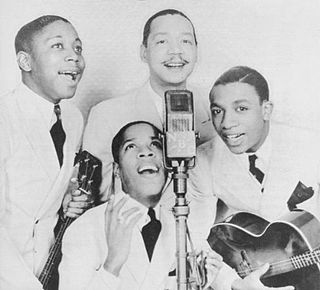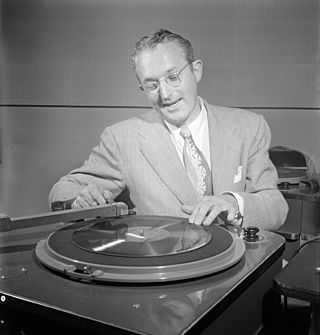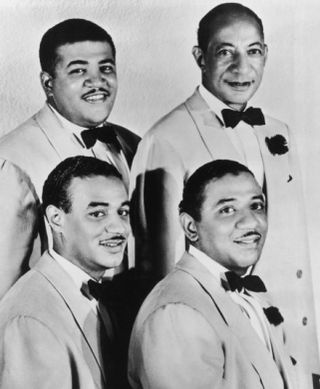
The Ink Spots were an American vocal pop group who gained international fame in the 1930s and 1940s. Their unique musical style predated the rhythm and blues and rock and roll musical genres, and the subgenre doo-wop. The Ink Spots were widely accepted in both the white and black communities, largely due to the ballad style introduced to the group by lead singer Bill Kenny.

Thomas Francis Dorsey Jr. was an American jazz trombonist, composer, conductor and bandleader of the big band era. He was known as the "Sentimental Gentleman of Swing" because of his smooth-toned trombone playing. His theme song was "I'm Getting Sentimental Over You". His technical skill on the trombone gave him renown among other musicians. He was the younger brother of bandleader Jimmy Dorsey. After Dorsey broke with his brother in the mid-1930s, he led an extremely successful band from the late 1930s into the 1950s. He is best remembered for standards such as "Opus One", "This Love of Mine" featuring Frank Sinatra on vocals, "Song of India", "Marie", "On Treasure Island", and his biggest hit single, "I'll Never Smile Again".

The Oak Ridge Boys are an American country and gospel vocal quartet originating in Oak Ridge, Tennessee. Since 2024, the group consists of Duane Allen, William Lee Golden, Richard Sterban, and Ben James. The group was founded in 1943 as the Oak Ridge Quartet. They became popular in Southern gospel during the 1950s. Their name was changed to the Oak Ridge Boys in the early 1960s, and they remained a gospel group until the mid-1970s, when they changed their image and concentrated on country music.

"Funky Drummer" is a single released by James Brown in 1970. Its drum break, improvised by Clyde Stubblefield, is one of the most frequently sampled music recordings.
The Four Tunes were a leading black pop vocal quartet during the 1950s. The members at the peak of their fame were Pat Best, Jimmy Gordon, Jimmie Nabbie, and Danny Owens.

The Dorsey Brothers were an American studio dance band, led by Tommy and Jimmy Dorsey. They started recording in 1928 for OKeh Records.

Melvin James "Sy" Oliver was an American jazz arranger, trumpeter, composer, singer and bandleader.

Legacy is a 2004 album by The Temptations for the Motown label, introducing new Temptations G.C. Cameron and Joe Herndon. The album was the group's final release on Motown; they left the label shortly after its release. "Somethin' Special" was a Top 40 hit on the Urban Adult Contemporary Charts peaking at #25. The cover photograph was taken by Aaron Rapoport.
"(I Love You) for Sentimental Reasons" is a popular song written by Ivory "Deek" Watson, founding member of the Ink Spots and of the Brown Dots, and William "Pat" Best, founding member of the Four Tunes.
The Larks were an American vocal group, active in the early 1950s. They were not the same group as the Los Angeles–based Larks featuring Don Julian, nor the Philadelphia-based group The Four Larks.

For Sentimental Reasons: 25 Early Vocal Classics is one of a number of albums released on the ASV/Living Era label, featuring recording artists mostly from the 1940s and 1950s, named for one of the major hits by the artist in question. This compact disc features recordings made by Nat King Cole between 1941 and 1946, at the beginning of Cole's career.
Sepia Cinderella is a 1947 American musical race film directed by Arthur H. Leonard. The film is notable for musical numbers by vocalists Billy Daniels and Sheila Guyse, and for a brief guest appearance by former child star Freddie Bartholomew, who is onscreen as himself for five minutes, telling gags to recharge his post-war career. It was the film debut of Sidney Poitier, who had an uncredited role.

"Whispering" is a popular song published in 1920 by Sherman, Clay & Co. of San Francisco. The 1920 copyright attributes the lyrics to Malvin Schonberger and the music to John Schonberger.

The Mills Brothers, sometimes billed The Four Mills Brothers and originally known as Four Boys and a Guitar, were an American jazz and traditional pop vocal quartet who made more than 2,000 recordings that sold more than 50 million copies and garnered at least three dozen gold records.

For Sentimental Reasons is a 1955 studio album by Ella Fitzgerald, issued on the Decca Records label. The album features tracks recorded during the late 1940s and early 1950s, that had been previously issued on 78rpm single.

Unforgettable is an original jazz compilation by Nat King Cole. It was initially released on a 10-inch LP in 1952, and it was reissued on a 12-inch LP in 1954.

William Francis Kenny Jr. was an American vocalist with a wide vocal range spanning four octaves. Often regarded as one of the most influential high-tenor singers of all time, Kenny was noted for his "bell-like" vocal clarity and impeccable diction. Although he is most famous for his role as lead tenor with the Ink Spots, Kenny also led a successful solo career after disbanding the Ink Spots in 1954. Throughout the 1950s and 60s Kenny recorded, toured the world and appeared on many popular variety television shows. In 1966 Kenny became the star and host of his own musical variety show The Bill Kenny Show which aired on CBC. In 1989, 11 years after his death, Bill Kenny was inducted into the Rock and Roll Hall of Fame. Kenny is often noted as being the "godfather" of R&B tenor vocalists.

The Checkers were an American doo-wop quintet formed in 1952. The original members were John Carnegie (Tenor/Lead), Charlie White (Tenor/Lead), Irwin "Teddy" Williams (Tenor), James Turner "Buddy" Brewer (Baritone), and Bill Brown. The group, only having recorded 25 singles for the King Records imprint and their subsidiary Federal Records broke up in 1955. The most notable aspect of the group was their constantly changing sound due to the 5 personnel changes that happened within their short existence. King kept on releasing bands under the pseudonym of "The Checkers" until the mid 70s.
Grant Kitchings was a singer who was a member of the Ravens then, in the 1970s, a member of the Drifters.
The Cues were an American R&B vocal group, who recorded both under their group name and under various other names as backing singers for artists on Atlantic Records and other labels in the 1950s. They recorded as the Rhythmakers with Ruth Brown; as the Blues Kings with Big Joe Turner; the Gliders with LaVern Baker; and as the Ivory Tones with Ivory Joe Hunter. Independently, they also recorded as the Four Students. Researcher Marv Goldberg has claimed that "because of their unique role in the recording industry, The Cues probably participated in more hit records than any other group."














